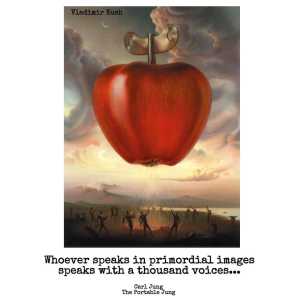Whoever speaks in primordial images speaks with a thousand voices;
Carl Jung Depth Psychology Facebook Group

Spirit in Man, Art, Literature
The impact of an archetype, whether it takes the form of immediate experience or is expressed through the spoken word, stirs us because it summons up a voice that is stronger than our own.
Whoever speaks in primordial images speaks with a thousand voices; he enthralls and overpowers, while at the same time he lifts the idea he is seeking to express out of the occasional and the transitory into the realm of the ever-enduring.
He transmutes our personal destiny into the destiny of mankind, and evokes in us all those beneficent forces that ever and anon have enabled humanity to find a refuge from every peril and to outlive the longest night.
it is the secret of great art, and of its effect upon us.
The creative process, so far as we are able to follow it at all, consists in the unconscious activation of an archetypal image, and in elaborating and shaping this image into the finished work.
By giving it shape, the artist translates it into the language of the present, and so makes it possible for us to find our way back to the deepest springs of life.
Therein lies the social significance of art: it is constantly at work educating the spirit of the age, conjuring up the forms in which the age is most lacking.
The unsatisfied yearning of the artist reaches back to the primordial image in the unconscious which is best fitted to compensate the inadequacy and one-sidedness of the present
The artist seizes on this image, and in raising it from deepest unconsciousness he brings it into relation with conscious values, thereby transforming it until it can be accepted by the minds of his contemporaries according to their powers ~Carl Jung, CW 15, Para 129-130
Carl Jung Depth Psychology Blog
God is a primordial experience
Psychology and Religion: West and East (The Collected Works of C. G. Jung, Volume 11)
“God’ is a primordial experience of man, and from the remotest times humanity has taken inconceivable pains either to portray this baffling experience, to assimilate it by means of interpretation, speculation, and dogma, or else to deny it.
And again and again it has happened, and still happens, that one hears too much about the “good” God and knows him too well, so that one confuses him with one’s own ideas and regards them as sacred because they can be traced back a couple of thousand years.
This is a superstition and an idolatry every bit as bad as the Bolshevist delusion that “God” can be educated out of existence.
Even a modern theologian like Gogarten’s is quite sure that God can only be good.
A good man does not terrify me what then would Gogarten have made of the Blessed Brother Klaus?
Presumably he would have had to explain to him that he had seen the devil in person.
And here we are in the midst of that ancient dilemma of how such visions are to be evaluated.
I would suggest taking every genuine case at its face value.
If it was an overwhelming experience for so worthy and shrewd a man as Brother Klaus, then I do not hesitate to call it a true and veritable experience
of God, even if it turns out not quite right dogmatically.
Great saints were, as we know, sometimes great heretics, so it is probable that anyone who has immediate experience of God is a little bit outside the organization one calls the Church.
The Church itself would have been in a pretty pass if the Son of God had remained a law-abiding Pharisee, a point one tends to forget. ~Carl Jung, Psychology and Religion, Brother Klaus, Paragraphs 480-481
